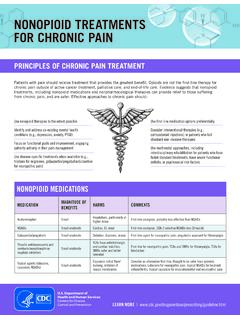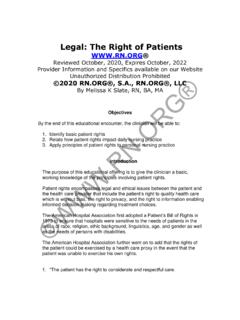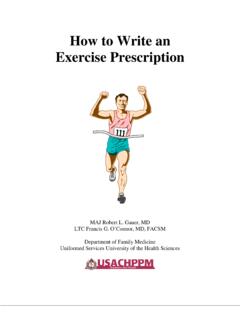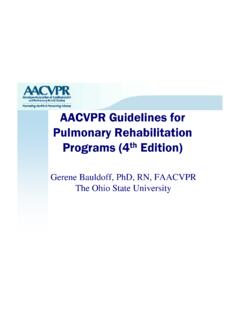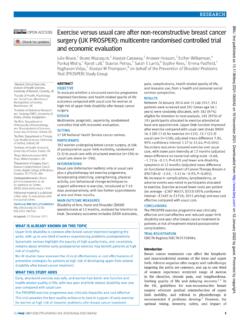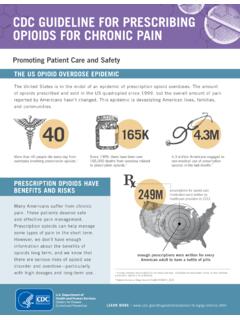Transcription of WHO/MNH/MND/96.9 MENTAL HEALTH CARE LAW: TEN …
1 WHO/MNH/ MENTAL HEALTH care LAW: TEN BASIC. principles . with Annotations Suggesting Selected Actions to Promote their Implementation This is an edited version of a WHO document which lists and describes ten basic principles of MENTAL HEALTH care law. It also provides annotations for their implementation in practice. KEY WORDS: HEALTH legislation / MENTAL HEALTH / MENTAL HEALTH care / human rights. This document is not a formal publication of the World HEALTH Organization (WHO), and all rights are reserved by the organization. The document may, however, be freely reviewed, abstracted, reproduced or translated, in part or in whole, but not for sale or for use in conjunction with commercial purposes.
2 Division of MENTAL HEALTH and Prevention of Substance Abuse World HEALTH Organization Geneva, 1996. TABLE OF CONTENTS. Foreword 1. Promotion of MENTAL HEALTH and Prevention of MENTAL Disorders 2. Access to Basic MENTAL HEALTH care 3. MENTAL HEALTH Assessments in Accordance with Internationally Accepted principles 4. Provision of the Least Restrictive Type of MENTAL HEALTH care 5. Self-Determination 6. Right to be Assisted in the exercise of Self-Determination 7. Availability of Review Procedure 8. Automatic Periodical Review Mechanism 9.
3 Qualified Decision-Maker 10. Respect of the Rule of Law FOREWORD. This WHO reference document lists and describes ten basic principles of MENTAL HEALTH care law. It also provides annotations for their implementation in practice. It is largely inspired from a comparative analysis of national MENTAL HEALTH laws in a selection of 45 countries worldwide conducted by WHO in recent years. Also, this selection of principles draws from the principles for the Protection of Persons with MENTAL Illness and the Improvement of MENTAL HEALTH care adopted by UN General Assembly Resolution 46/119 of 17 December 1991 (hereafter referred to as "UN principles ").
4 This instrument was primarily produced to address a need frequently and insistently expressed by Member States, experts and other interested parties. It consists of a straightforward account of key reference principles and implementation tips. The instrument aims to depict basic legal principles for the field of MENTAL HEALTH with as little influence as possible from given cultures or legal traditions. Embodiment of these principles into the legal body of a jurisdiction in a format, structure and language that suit local requirements is best handled on an ad hoc basis by state authorities.
5 The result is by no means a model act. It does not exhaust the relevant principles specifically applicable to MENTAL HEALTH care . Further, it is subordinated to more general principles generally applicable to HEALTH care at large, such as that of confidentiality. As a result, it is meant to be considered by individuals in an official ( lawmakers, public HEALTH managers, MENTAL HEALTH care providers) or private ( persons with MENTAL disorders, family members, MENTAL HEALTH advocates) capacity. Special acknowledgments are owed to the National Institute of MENTAL HEALTH (USA) for its important contribution which made possible the development of the project of which this document is an offspring.
6 We are also grateful to the Department of HEALTH (UK), to the Foreign and Commonwealth Office (UK), to the Ministry of Justice (The Netherlands), to Friends of Switzerland (Boston). and to Swissair (Boston) for their respective generous contributions to the completion of projects which have led to the production of this instrument. Dr J. A. Costa e Silva, Director, Division of MENTAL HEALTH and Prevention of Substance Abuse 1. Promotion of MENTAL HEALTH and Prevention of MENTAL Disorders Description Everyone should benefit from the best possible measures to promote their MENTAL well-being and to prevent MENTAL disorders.
7 Components This principle includes the following components: 1. MENTAL HEALTH promotion efforts;. 2. MENTAL disorders prevention efforts. Implementation Selected actions suggested to promote this principle include: 1. Promoting behaviours which contribute to enhancing and maintaining MENTAL well-being. 2. Identifying and taking appropriate actions to eliminate the causes of MENTAL disorders. 2. Access to Basic MENTAL HEALTH care Description Everyone in need should have access to basic MENTAL HEALTH care . Components This principle includes the following components: 1.
8 MENTAL HEALTH care should be of adequate quality, : a. preserve the dignity of the patient;. b. take into consideration and allow for techniques which help patients to cope by themselves with their MENTAL HEALTH impairments, disabilities and handicaps;. c. provide accepted and relevant clinical and nonclinical care aimed at reducing the impact of the disorder and improving the quality of life of the patient;. d. maintain a MENTAL HEALTH care system of adequate quality (including primary HEALTH care , outpatient, inpatient and residential facilities).
9 2. Access to MENTAL HEALTH care should be affordable and equitable;. 3. MENTAL HEALTH care should be geographically accessible;. 4. MENTAL HEALTH care should be available on a voluntary basis, as HEALTH care in general;. 5. Access to HEALTH care , including MENTAL HEALTH care , is contingent upon the available human and logistical resources. Implementation Selected actions suggested to promote this principle are: 1. Having a specific provision in the law which guarantees quality HEALTH care , preferably a general provision on HEALTH care applying to MENTAL HEALTH by extension.
10 2. Having medical practices in keeping with quality assurance guidelines such as those developed by WHO;. 3. Havingdeveloped and/or adapted at national level quality assurance guidelines and instruments by and for all qualified professionals or governmental bodies;. 4. Offering MENTAL HEALTH care which is culturally appropriate;. 5. Calling for and taking into consideration the patient's assessment of the quality of care ;. 6. Having treatments, decisions and measures regarding a person to whom MENTAL HEALTH care is provided, documented in the person's medical record.










